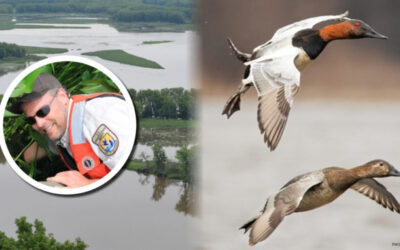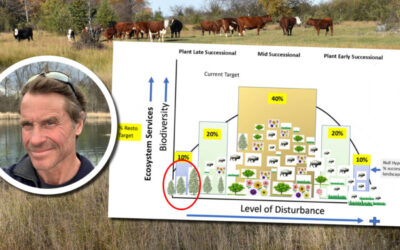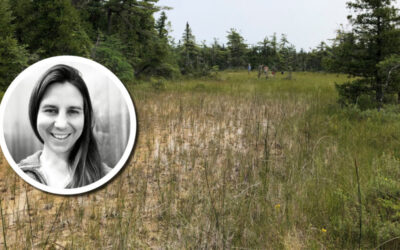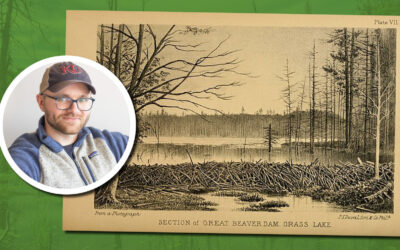Wetland Coffee Break
The Wetland Coffee Break series helps keep our community of wetland lovers connected and learning about wetlands throughout the year, from anywhere! Bring your coffee and learn about wetlands, the plants and animals that call them home, and the many natural benefits they provide to our communities. Sessions are held on Zoom and feature time for audience Q&A.
See below for a list of upcoming presentations and to register. Once you register, you’ll receive an automatic email including the URL link and password you’ll need to access the meeting. We record and post each presentation so you can watch any that you missed live. You’ll find links to these recordings below, and you can also find them on our Facebook page.
We are grateful to all of the presenters for sharing their knowledge and expertise and to everyone interested in learning more about wetlands! If you are interested in giving a Wetland Coffee Break presentation, or if you have a wetland topic you’d like to see covered, please contact Katie.Beilfuss@wisconsinwetlands.org.
We are now able to provide attendance verification to Wetland Coffee Break audience members who attend the live sessions and request this service. We created this mechanism in response to requests from members of the Wetland Coffee Break audience who would like to apply their Wetland Coffee Break learning to their continuing education or certification requirements. Learn more about how to receive attendance verification here.

Register for a Wetland Coffee Break
A primer on aerial imagery reviews
Sarah Majerus, Stantec
Friday, May 2, 2025
10:30 am CT
Description
Interpretation of historic and current aerial photography is an important skill for wetland ecologists of all disciplines because it helps tell the story of land use over time. Whether you are conducting a wetland delineation or planning for habitat restoration, review of historic aerial imagery can reveal land use changes that help you better understand soil structure, hydrology, and vegetative patterns. In this session, wetland ecologist Sarah Majerus will discuss potential sources of aerial imagery, acceptable methods for interpretation, and requirements for wetland delineations in Wisconsin. She will also review case studies and collectively evaluate various wetness signatures to illustrate the intricacies of this practice.
Sarah Majerus is a wetland ecologist with more than 15 years of experience working with partners to provide integrated solutions that minimize impacts to natural resources and provide ecological function for the future. Her expertise includes wetland delineation, permitting, watershed planning, and habitat restoration. She is a professional wetland scientist (PWS) with the Society of Wetland Scientists and a Wisconsin DNR Assured Wetland Delineator.
Wetland monitoring and assessment 101
Sally Jarosz, Wisconsin DNR
Friday, May 9, 2025
10:30 am CT
Description
Ecologist Sally Jarosz will provide an introduction to the wetland monitoring and assessment methodologies employed by the Wisconsin Department of Natural Resources. She will share wetland assessment considerations, links to user guides, and additional information about designing a wetland monitoring or assessment effort.
Sally Jarosz has worked for the Wisconsin Department of Natural Resources for 14 years in various roles in the waterway and wetland regulatory program and the water quality program. She has served as the statewide wetland monitoring and assessment coordinator for the past 6 years. She holds a masters degree in wetland ecology from the University of Wisconsin Botany Department and a bachelors degree in biology from Mary Washington College in Virginia.
Bioacoustic evidence that bats benefit from beaver ponds
Cortney Dean, UW-Stout graduate student
Friday, May 30, 2025
10:30 am CT
Description
Wisconsin’s beaver management policies are primarily aimed at benefiting the state’s trout populations. But what if beaver ponds are ideal habitats for threatened and endangered species like the bats of Wisconsin? Research being done in northern Wisconsin suggests that beaver ponds are a source of increased bat activity and foraging as compared to beaver-free streams. This begs the question: Can and should we leverage natural (and low cost) beaver activity to support and create new habitat for species of conservation concern?
Cortney Dean is a graduate student at UW-Stout researching the ecosystem impacts of beavers and beaver ponds in Northwest Wisconsin. She is currently finishing her thesis in anticipation of graduating in May!
Makak Aabajitoon Ganawendang Manoomin: Guiding wild rice conservation with Anishinaabe worldview
Brandon Byrne, Great Lakes Indian Fish & Wildlife Commission, and Blaine Rothrock, Northwestern University
Friday, July 18, 2025
10:30 am CT
Description
Manoomin (wild rice) occurs throughout the western Great Lakes basin. It played a central role in the Anishinaabe migration story and has long been sacred in sustaining the Anishinaabe lifeway. Abundance of manoomin has declined in recent decades on lakes once supporting major beds in Wisconsin. Manoomin has garnered significant research interest in recent years due to its importance to the identity of Ojibwe and other Indigenous peoples inhabiting the Great Lakes region. Historically, research efforts excluded Traditional Ecological Knowledge; however, with clear alignment of goals, collaborative research can complement tribal interests, strengthen partnerships, and lead to higher impact. Using a co-design approach, researchers at the Georgia Institute of Technology and Northwestern University collaborated with Ojibwe nations and the Great Lakes Indian Fish and Wildlife Commission to develop a low-cost remote sensor to monitor environmental factors affecting manoomin.
Brandon Byrne is an Inland Fisheries Biologist for the Great Lakes Indian Fish & Wildlife Commission (GLIFWC). His work focuses on assessing inland fish populations in northern Wisconsin and Michigan and assisting GLIFWC member Tribes with the protection of Ceded Territory fish populations and habitat. Brandon previously co-managed GLIFWC’s Manoomin Program as a Wetland Ecologist.
Blaine Rothrock is a Computer Science PhD candidate at Northwestern University. He earned his master’s degree in artificial intelligence from Northwestern University and his bachelor’s degree in informatics from Indiana University. Blaine’s work focuses on novel applications of health wearables and environmental sensors, with the ultimate goal of democratizing access to the development of ubiquitous embedded devices to promote research, creativity, and education.
Investigating the relationship between showy ladyslipper and European skipper butterflies
Matt Knickelbine, Stantec
Friday, Aug 1, 2025
10:30 am CT
Description
While working on wetland delineations, environmental scientist Matt Knickelbine has been observing instances of showy lady slipper (Cypripedium reginae) flowers being filled with dead European skipper butterflies (Thymelicus lineola). Showy lady slipper is an inhabitant of a variety of wetland types and is susceptible to many other stressors, including deer browse, habitat destruction, and changes to groundwater processes. European skipper butterflies were introduced to North America by accident in 1910 and require hayfields near nectar sources. Showy lady slipper is a species of special concern in Wisconsin, endangered in Illinois. It is protected by law as the State Flower of Minnesota. Learn about Matt’s observations, past accounts of this phenomenon that Matt discovered in the literature, and ideas for future research.
Matt Knickelbine is an environmental scientist at Stantec and a Wisconsin DNR Assured Wetland Delineator. He mostly works on wetland science and botany projects but also has experience in restoration ecology, wildlife surveys, and landscape-level ecology, to name a few.
Watch previous presentations
Click “Older Entries” below to see more past presentations, or view our Google Sheet index of past presentations here.
Wetland Coffee Break: What do fall-staging canvasbacks need on the Upper Mississippi River?
Stephen Winter, wildlife biologist for the USFWS, uses information from previous research and aerial survey data to highlight three important components of canvasback habitat quality on the Upper Mississippi River.
Wetland Coffee Break: Invasive species or invasible ecosystems?
Stephen’s talk was a favorite among attendees at the conference, so we asked him to join us for a Wetland Coffee Break presentation to share how many invasive species are better understood as symptoms of a stressed ecosystem.
Wetland Coffee Break: Chasing dragonflies: Leveraging genetic tools to help conserve Hine’s emerald dragonfly
Dr. Toczydlowski will talk about how she and her collaborators are leveraging genetic tools, including environmental DNA (eDNA), to build our knowledge of Hine’s Emerald Dragonfly.
Wetland Coffee Break: The fur trade and the north woods environment
Between 1630 and 1830, fur hunters exterminated more than 95 percent of the region’s beaver population. In this talk, Hayden Nelson shares how the historical overhunting of beavers substantially altered the forested wetlands around Lake Superior.
Wetland Coffee Break: For the love of wetlands: Exploring wetland protection and restoration potential in Wisconsin
The Nature Conservancy in Wisconsin has developed multiple tools to highlight high quality wetlands to prioritize protection efforts as well as impaired wetlands with high restoration potential.
Wetland Coffee Break: Into Whooperland: A photographer’s journey with whooping cranes
Conservation photographer Michael Forsberg spent the last five years camera-in-hand exploring the natural history of whooping cranes across the continent, meeting people who love them, and discovering how these tall, magnificent, and rarest of cranes are navigating...






